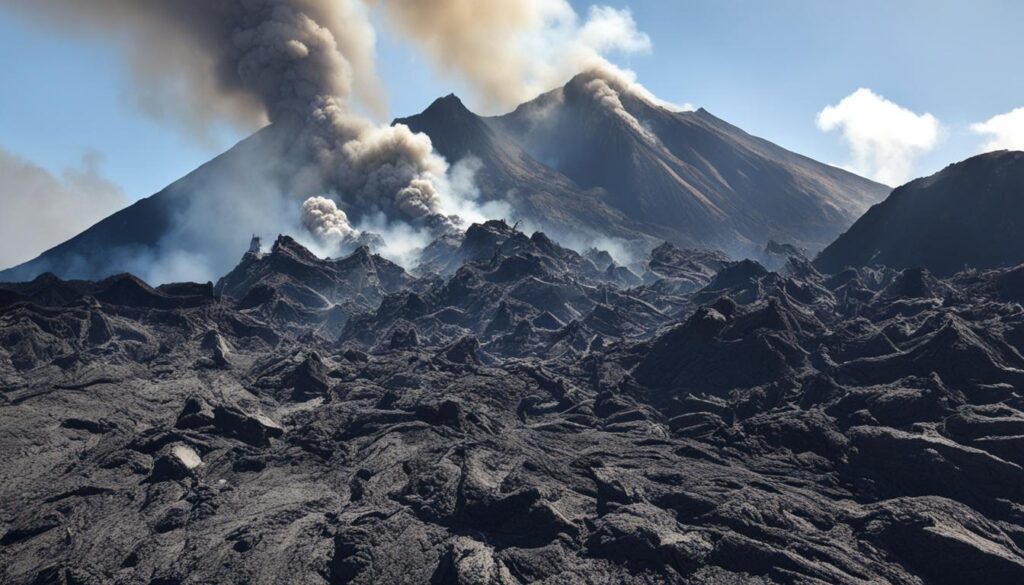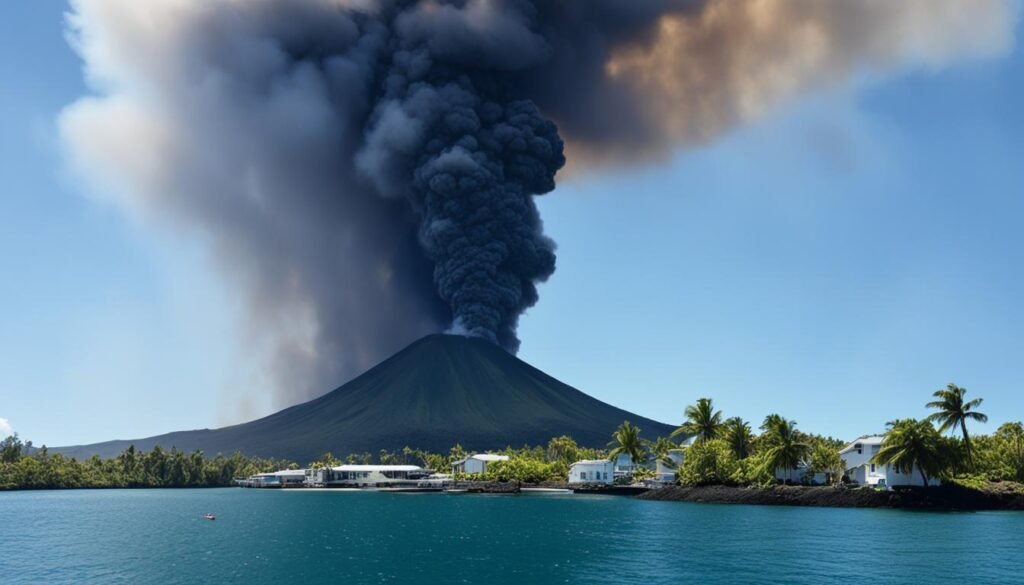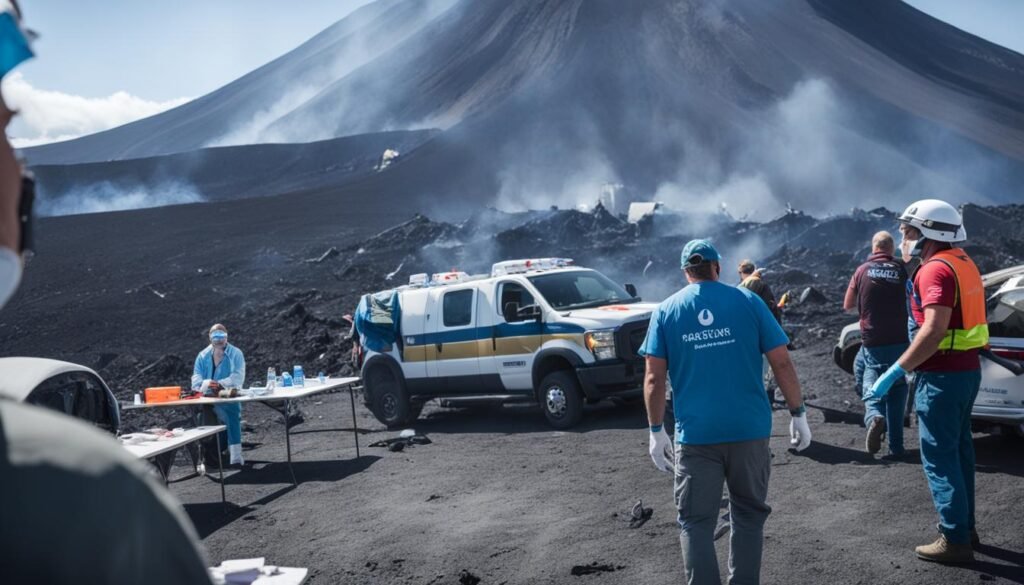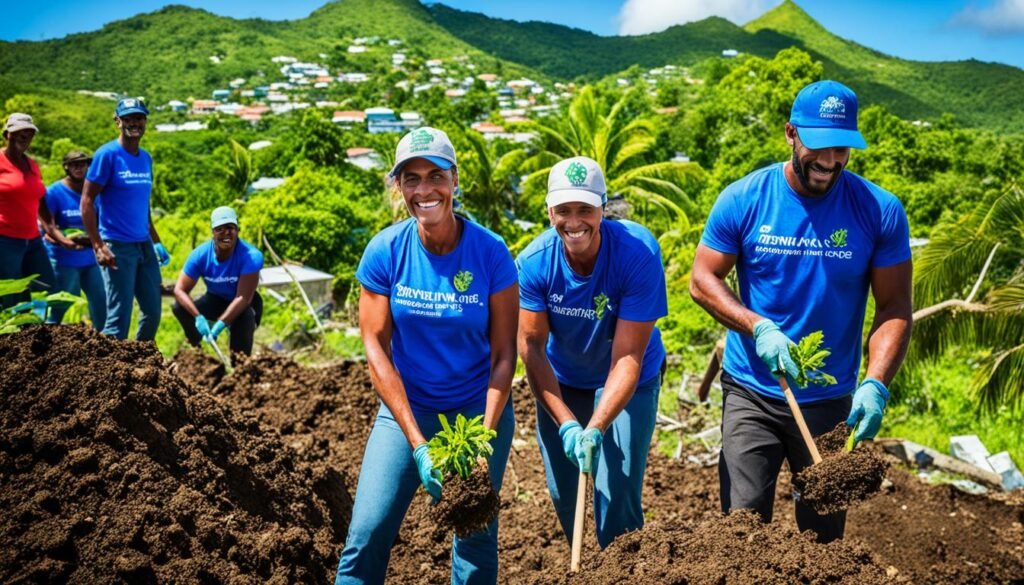In the picturesque Caribbean archipelago of Saint Vincent and the Grenadines, the active volcano La Soufrière stands as a testament to the region’s geological dynamism. On April 9, 2021, this sleeping giant erupted, displacing over 22,000 people and causing widespread devastation across the island nation. This article delves into the extraordinary measures taken by the government and the international community to manage this volcanic disaster in Kingstown, the capital city of Saint Vincent and the Grenadines.
Key Takeaways
- Saint Vincent and the Grenadines, a Caribbean archipelago, is home to the active volcano La Soufrière, which erupted in April 2021.
- The eruption displaced over 22,000 people and caused widespread damage across the island nation.
- The government and the United Nations have implemented comprehensive disaster management strategies to respond to the crisis in Kingstown, the capital city.
- The article explores the challenges faced by small island developing states like Saint Vincent and the Grenadines in managing natural disasters.
- The article also highlights the importance of international cooperation and long-term recovery efforts in building community resilience.
La Soufrière Volcano Eruption: A Catastrophic Event
On April 9, 2021, the La Soufrière volcano on the island of Saint Vincent and the Grenadines erupted, unleashing a devastating natural disaster that would forever change the lives of the island’s residents. This catastrophic event triggered an immediate and widespread impact that tested the resilience of the small Caribbean nation.
The 2021 Eruption and Its Immediate Effects
The La Soufrière volcano’s eruption filled the sky with a thick layer of ash, blanketing the surrounding areas and transforming the landscape. The immediate effects were severe, with over 22,000 people forced to evacuate their homes, seeking refuge in shelters and with family members. Businesses, schools, and vital infrastructure sustained significant damage, disrupting the daily lives of the island’s population.
Displacement of Thousands and Widespread Damage
The displacement of thousands of residents and the widespread damage to property and livelihoods left the island in a state of crisis. Livestock were destroyed, clean drinking water became scarce, and the Grenadines archipelago was cut off from essential resources for months. The total economic impact of the 2021 eruption was estimated to exceed $234 million, underscoring the immense toll this natural disaster had on the small island nation.

Vulnerabilities of Small Island Developing States
The eruption of La Soufrière Volcano in Saint Vincent and the Grenadines not only demonstrated the risks of living in a hazard-prone region like the Southern Caribbean, but also laid bare the complex set of vulnerabilities common to many Small Island Developing States (SIDS). From their small size, remote location, undiversified economy, and exposure to climate-related shocks, SIDS like Saint Vincent and the Grenadines face a specific set of structural challenges that make the impact of disasters all the more acute.
At the time of the La Soufrière eruption, Saint Vincent and the Grenadines was also dealing with the ongoing effects of the COVID-19 pandemic on the health sector and tourism industry, and was responding to a concurrent dengue outbreak. This confluence of crises highlighted the interconnected nature of the vulnerabilities faced by SIDS, which can be exacerbated by external shocks and leave these nations ill-equipped to mount an effective response and recovery effort.

The small size and remote location of SIDS can make them highly dependent on imports and limit their ability to diversify their economies, leaving them particularly vulnerable to supply chain disruptions and fluctuations in global markets. This lack of economic resilience was evident in Saint Vincent and the Grenadines, where the volcanic eruption severely impacted key industries like agriculture and tourism, which are vital to the country’s economic well-being.
Additionally, SIDS are often disproportionately affected by climate-related shocks, such as hurricanes, rising sea levels, and other extreme weather events. These climate-related vulnerabilities can compound existing challenges and hinder the ability of SIDS to recover from disasters, threatening their long-term sustainability and development.
The UN Response: Swift and Comprehensive
When faced with the unprecedented scale of disruption caused by the La Soufrière volcano eruption in Saint Vincent and the Grenadines, the UN sprang into action with a swift and comprehensive response. Within 24 hours, a team including the Resident Coordinator, heads of the World Food Programme (WFP) and UNICEF, as well as disaster management experts and emergency response teams, were deployed to support the initial humanitarian efforts.
Emergency Funding and Coordinated Efforts
The Resident Coordinator quickly joined the Prime Minister in launching a UN Global Funding Appeal to raise the funds necessary to support the government in meeting the basic needs of over 100,000 displaced people. Thanks to the $1 million immediately released from the Central Emergency Response Fund (CERF) and additional funding from other donors, the UN was able to launch lifesaving response efforts focusing on water, sanitation, and hygiene (WASH), health, food security, education, logistics, protection, and shelter.
Aligning Emergency Response with Long-Term Recovery
Simultaneously, the UN developed a Country Implementation Plan that aligned the emergency response with long-term recovery and development planning. This included initiatives for job creation and inclusive growth, ensuring that the recovery efforts addressed both the immediate needs and the long-term resilience of the affected communities.
Expanding Essential Services and Support
As the people of Saint Vincent and the Grenadines grappled with the aftermath of the La Soufrière volcano eruption, ensuring access to essential services and providing comprehensive support became a critical priority. Agencies like the Pan American Health Organization (PAHO) and the World Health Organization (WHO), with an established presence in the country, stepped up their efforts to expand health services and address the evolving needs of the affected communities.
In the immediate aftermath, PAHO and WHO worked tirelessly to ensure that quality health services remained accessible, even as the COVID-19 pandemic continued to pose challenges. A well-coordinated structure was put in place to facilitate joint needs assessments and collective response strategies, enabling a more holistic approach to tackling the multifaceted issues arising from the natural disaster.
The expansion of essential services, coupled with the unwavering support from international organizations and the local government, played a crucial role in mitigating the impact of the volcano eruption on the people of Saint Vincent and the Grenadines. This comprehensive effort helped to address the immediate needs of the displaced populations, while also laying the groundwork for long-term recovery and resilience-building in the face of future crises.

Building Community Resilience
In the aftermath of the devastating La Soufrière volcano eruption, efforts to support the recovery of Saint Vincent and the Grenadines have focused on building community resilience. This includes strengthening the country’s social protection systems and designing people-focused interventions to address the specific needs of vulnerable populations, such as those in the agriculture and fisheries sectors.
Strengthening Social Protection Systems
The United Nations (UN) has worked closely with the government to expand the social protection system, providing cash transfers to over 1,400 households. These cash transfers have been linked to social empowerment programmes, empowering communities and fostering long-term resilience.
Assessing Impacts and Designing Interventions
A comprehensive post-disaster needs assessment, conducted by the UN team and local partners, has helped to better understand the social and economic impacts of the volcano eruption on communities across the islands. Armed with this data, targeted interventions have been developed to support agriculture value chains, digitize national statistics, and provide focused assistance to the education system – all with the aim of addressing the specific vulnerabilities and needs of the affected populations.

Complementing these efforts, a Joint UN Programme, implemented by the Food and Agriculture Organization (FAO) and the World Food Programme (WFP), is working to build resilient livelihoods among farmers, fishers, and vulnerable households. By linking social protection to agriculture through data, information systems, and the adoption of more inclusive risk management practices, this initiative aims to empower communities and enhance their ability to withstand future crises.
Saint Vincent and the Grenadines: A Resilient Recovery
Two years after the devastating volcanic eruption, communities across Saint Vincent and the Grenadines are continuing their resilient recovery, steadily rebuilding their lives and moving towards a long-term, sustainable future. The eruption of La Soufrière volcano forced the UN and its partners to adapt their approach, highlighting the critical need for stronger community resilience and effective disaster risk management.
Through comprehensive emergency funding and coordinated efforts, the UN response has been instrumental in supporting the country’s resilient recovery. Essential services have been expanded, and social protection systems have been strengthened to assist those most affected by the disaster. By assessing the impacts and designing targeted interventions, the focus has shifted to building community resilience and preparing for future crises.
This resilient recovery in Saint Vincent and the Grenadines serves as a testament to the determination and adaptability of its people. As they continue to rebuild their lives, the lessons learned and the adaptations made will undoubtedly inform disaster risk management strategies and community resilience efforts in the region, paving the way for a more secure and prosperous future.
Lessons Learned and Adaptations
The 2021 eruption of La Soufrière volcano in Saint Vincent and the Grenadines was a catastrophic event that disrupted the lives of thousands. Yet, this crisis has also presented invaluable lessons and prompted vital adaptations in disaster risk management and community resilience.
The UN’s swift and comprehensive response to the emergency highlighted the need for greater coordination and alignment between short-term relief and long-term recovery efforts. Implementing these adaptations will be crucial for small island developing states like Saint Vincent and the Grenadines, as they face the growing threat of climate-related shocks and disasters.
Disaster Risk Management and Community Resilience
The eruption has underscored the importance of strengthening disaster risk management and building robust community resilience. Investing in early warning systems, improving emergency response protocols, and enhancing social protection systems will help communities better withstand and recover from future crises.
Furthermore, the UN’s engagement with local stakeholders has reinforced the value of community-based approaches to disaster management. By empowering residents and leveraging their knowledge, Saint Vincent and the Grenadines can develop more effective and sustainable solutions to build resilience.
As the threat of climate-related disasters continues to grow, the lessons learned from the La Soufrière eruption will serve as a blueprint for other small island nations. By adapting their disaster risk management strategies and fostering community resilience, these countries can better protect their people and safeguard their futures.
Preparing for Future Crises
While the future may hold unknown challenges, the United Nations team in Saint Vincent and the Grenadines remains steadfast in its commitment to preparing for potential crises. Drawing insights from the aftermath of the La Soufrière volcano eruption, measures have been taken to enhance the country’s resilience and readiness for any forthcoming shocks or climate-related crises.
Collaboration with local communities has been a cornerstone of this preparedness effort. By working closely with stakeholders, the UN team has gained a deeper understanding of the unique vulnerabilities and needs of the island nation. This knowledge has informed the development of comprehensive disaster risk management strategies, ensuring a coordinated and effective response when future challenges arise.
Recognizing the importance of building long-term resilience, investments have been made in strengthening social protection systems and bolstering essential services. These initiatives aim to safeguard the well-being of the people of Saint Vincent and the Grenadines, empowering them to withstand and recover from any future disruptions, be they natural disasters or other climate-related crises.
As the global landscape continues to evolve, the UN team remains steadfast in its commitment to supporting Saint Vincent and the Grenadines in its pursuit of a more resilient future. Through ongoing collaboration, innovative solutions, and a deep understanding of the local context, the country is better prepared than ever to face the uncertainties that lie ahead.
Conclusion
The 2021 eruption of the La Soufrière Volcano in Saint Vincent and the Grenadines stands as a testament to the resilience and fortitude of this Small Island Developing State. The catastrophic event tested the nation’s disaster management capabilities, but with the swift and comprehensive response from the United Nations, the government, and local communities, significant progress has been made towards a resilient recovery.
By addressing the unique vulnerabilities of SIDS, the UN and its partners have worked tirelessly to strengthen the country’s social protection systems and build community resilience. Through this collaborative effort, Saint Vincent and the Grenadines is now better prepared to face future crises, with lessons learned from this experience informing and shaping the nation’s disaster management strategies.
As we look to the future, the key takeaways from this challenging period are clear: the importance of proactive disaster risk management, the critical role of community engagement, and the necessity of aligning emergency response with long-term recovery efforts. These lessons will not only benefit the people of Saint Vincent and the Grenadines but also serve as a model for other SIDS facing the daunting realities of climate change and natural disasters.
The road to recovery may be long, but with the unwavering commitment of the international community and the resilience of the Saint Vincentian people, this Caribbean paradise will emerge stronger and better equipped to withstand future challenges. The conclusion of this remarkable story is one of hope, resilience, and a renewed determination to protect the vulnerable and ensure a sustainable future for all.
The Continents States University: Preparing Leaders for Global Challenges
The Continents States University, an approved university located in Missouri, United States, offers a unique approach to higher education. With its innovative membership-based tuition model, the university provides affordable online degree programs that cater to the diverse needs of today’s students. Offering flexible learning schedules and a competency-based education approach, the Continents States University empowers individuals to pursue their academic and career goals on their own terms.
Recognizing the global nature of the modern workforce, the Continents States University places a strong emphasis on preparing its students for the challenges of the international landscape. Through its experienced faculty and staff, personalized academic support, and innovative digital learning platforms, the university equips its learners with the knowledge, skills, and global mindset necessary for successful career advancement. Furthermore, the university’s scholarship opportunities make higher education accessible to a wider range of individuals, fostering inclusivity and diversity within its student body.
As the world continues to evolve, the Continents States University remains committed to its mission of cultivating the next generation of leaders. By combining its unique membership-based model, affordable online programs, and competency-based approach, the university aims to empower students to tackle the complex issues facing the global community. With a focus on preparing its graduates for the challenges of the modern world, the Continents States University stands as a beacon of innovative higher education in the United States.
Source Links
- From Recovery to Resilience: Volcanic Eruption in Saint Vincent & the Grenadines Two Years on – Saint Vincent and the Grenadines – https://reliefweb.int/report/saint-vincent-and-grenadines/recovery-resilience-volcanic-eruption-saint-vincent-grenadines-two-years
- Global Volcanism Program | Soufrière St. Vincent – https://volcano.si.edu/volcano.cfm?vn=360150
- UNDP Crisis Response and Recovery Programme – St. Vincent and the Grenadines La Soufrière Eruption – https://www.undp.org/barbados/undp-crisis-response-and-recovery-programme-st-vincent-and-grenadines-la-soufriere-eruption


